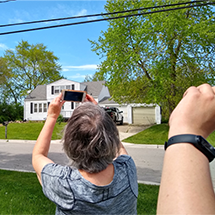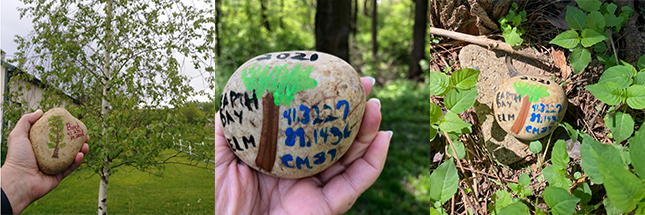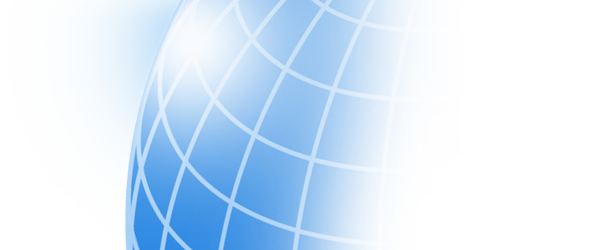People - GLOBE Observer
Donna Blomquist
Where are you from?
Illinois in the U.S. has been my home, and I’ve lived in very urban Chicago, many suburban areas and for the past 20+ years, have lived in a very rural area of north central Illinois, in the country, outside of a little town of 750 people.
What do you do?
As a Programming Librarian (at a public library, in a community of about 9,000 people), I wear a variety of hats – hosting preschool story time, providing reading recommendations and circulation (check-outs), visiting classrooms and hosting activities, providing community outreach programs to senior living centers, hosting family, youth and adult events, arranging authors and experts programs, planning “teach the teacher” workshops, providing teacher curriculum support, and writing and implementing grants. NASA and GLOBE resources contribute a great deal to the Library’s programming – both adult and youth.

Participants take Observer measurements during a LaSalle Public Library adult program
How do you use GLOBE Observer and tell us about how GLOBE Observer relates to your gratitude rocks project with the LaSalle Public Library?
While we have used GLOBE Clouds, Land Cover, Trees and Mosquito Habitats, all with adult, youth and family audiences, the Library’s “go to” programming favors Clouds, Mosquito Habitats, and Trees.
Clouds is a favorite with all audiences, and provides a range of activities that can be completed outdoors or indoors, if weather complications occur. It is a natural “first step” into citizen science – offering simple activities that teach big ideas and provide data that supports a better understanding of our world. It is also the most ADA (Americans with Disabilities Act) accessible, allowing everyone to enjoy the experience and to contribute to citizen science.
GLOBE Mosquito Habitats is a favorite with families; we have hosted GLOBE Mosquito Habitats in a nearby nature preserve where participants have set and examined traps, still water areas, and streams. On neighborhood walks, participants have identified unwanted mosquito habitats throughout the community. Because LaSalle is a river town, many of these unwanted habitats are found in debris along the Illinois River. Our programs place special emphasis on litter clean-up to remove unnatural habitats. These outdoor activities are paired with indoor programs that teach participants about the life cycle of mosquitoes, their appearance at each stage, the diseases related to mosquitoes as vectors, both locally, and around the world.

Examples of Gratitude Rocks in the hand and in the field
GLOBE Trees is my favorite. These events are great for all ages – even young children can be successful using the GLOBE app, recording and submitting data. The Trees program is further supported with memorable experiences, like nature walks, leaf collection, bark rubbings, and rock painting. The project called gratitude rocks, encourages participants, young and old, to document tree measurements for comparison the following year, by adding the GLOBE Trees data to a rock, either with outdoor paint or permanent marker. The scientist/artist decorates the rock with an image of their tree, or perhaps a leaf from that tree, and adds an appreciative message about the importance of the tree, e.g., “A shady place on a summer day.” The rock can be placed at the base of the tree as a decorative marker, a locator, and a reminder to measure again the following year. GLOBE Trees programming is a very popular introduction of citizen science to the community. In addition to furnishing important data, and teaching about how the Earth and all of us benefit from trees, it is a program that attracts and retains individuals in citizen science work throughout the year – seasonal like the trees themselves.
How do you plan to use GLOBE Observer in the future?
GLOBE Observer will continue to be a key programming component. The activities are versatile and effective whether virtual, in-person, as a group or working independently as distance-learning. Most importantly, the GLOBE citizen science programs are very popular; the interest in the sciences has grown dramatically in this community. By engaging people, young and old, in observation and data collection, and communicating to them the importance of their contribution, we all benefit.
Why is citizen science important to you?
Our world is a complex place. The tiniest observations can have significant importance, and when multiplied, singular observations become data, and data leads to discovery and understanding. It is important, and citizen science allows non-scientists to contribute, to own a piece of understanding that will give us and the Earth a better future.
What advice do you have for people just getting into citizen science?
Do it! If you are working on an individual project, choose something you really love – trees, birds, animals visible on a camera trap, light pollution, flora, water quality – there are so many projects. Jump in. Citizen Science grows on you. Make a kit. Keep a journal. Take pictures. Involve family and friends. Take the first step – you’ll be in for a lifetime!
What do you do for fun?
I’m a librarian, so of course, I love books, especially nonfiction and biography. I enjoy birding, time with my family and fun with all of our pets ¬– horses, dogs, cats and a rabbit named Dorsey. And I love learning about new things – from the fascinating cicadas to backyard astronomy to making unusual pizzas – very eclectic…which dovetails nicely with my job as a librarian.
What inspires you?
Nature, discovery, compassion, courage.
Any favorite quote(s) that you would like to share?
“Be the change you wish to see in this world.”-Gandhi
“We are very lost. And yet, it is an exhilarating feeling, for being lost implies the unknown, and that is exactly what we seek.” -from Gumball Poetry, The Lost Journals of Edward von Lemkes.








